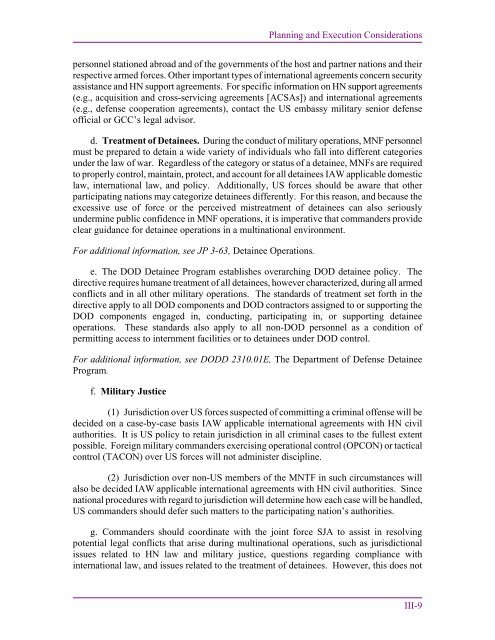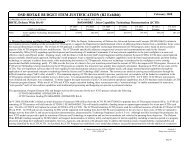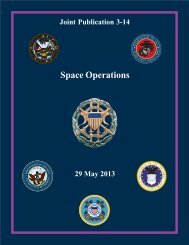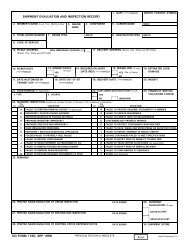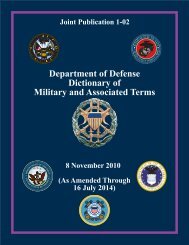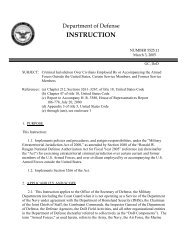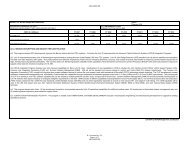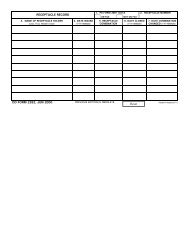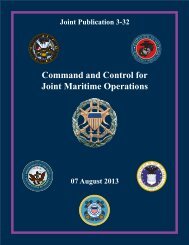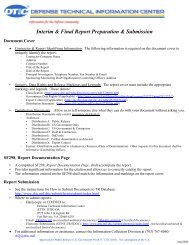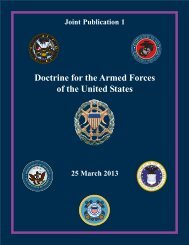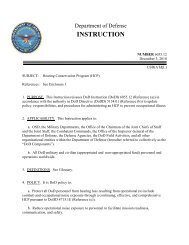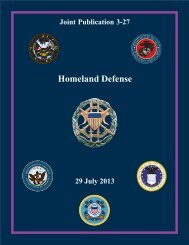JP 3-16, Multinational Operations - Defense Technical Information ...
JP 3-16, Multinational Operations - Defense Technical Information ...
JP 3-16, Multinational Operations - Defense Technical Information ...
You also want an ePaper? Increase the reach of your titles
YUMPU automatically turns print PDFs into web optimized ePapers that Google loves.
Planning and Execution Considerations<br />
personnel stationed abroad and of the governments of the host and partner nations and their<br />
respective armed forces. Other important types of international agreements concern security<br />
assistance and HN support agreements. For specific information on HN support agreements<br />
(e.g., acquisition and cross-servicing agreements [ACSAs]) and international agreements<br />
(e.g., defense cooperation agreements), contact the US embassy military senior defense<br />
official or GCC’s legal advisor.<br />
d. Treatment of Detainees. During the conduct of military operations, MNF personnel<br />
must be prepared to detain a wide variety of individuals who fall into different categories<br />
under the law of war. Regardless of the category or status of a detainee, MNFs are required<br />
to properly control, maintain, protect, and account for all detainees IAW applicable domestic<br />
law, international law, and policy. Additionally, US forces should be aware that other<br />
participating nations may categorize detainees differently. For this reason, and because the<br />
excessive use of force or the perceived mistreatment of detainees can also seriously<br />
undermine public confidence in MNF operations, it is imperative that commanders provide<br />
clear guidance for detainee operations in a multinational environment.<br />
For additional information, see <strong>JP</strong> 3-63, Detainee <strong>Operations</strong>.<br />
e. The DOD Detainee Program establishes overarching DOD detainee policy. The<br />
directive requires humane treatment of all detainees, however characterized, during all armed<br />
conflicts and in all other military operations. The standards of treatment set forth in the<br />
directive apply to all DOD components and DOD contractors assigned to or supporting the<br />
DOD components engaged in, conducting, participating in, or supporting detainee<br />
operations. These standards also apply to all non-DOD personnel as a condition of<br />
permitting access to internment facilities or to detainees under DOD control.<br />
For additional information, see DODD 2310.01E, The Department of <strong>Defense</strong> Detainee<br />
Program.<br />
f. Military Justice<br />
(1) Jurisdiction over US forces suspected of committing a criminal offense will be<br />
decided on a case-by-case basis IAW applicable international agreements with HN civil<br />
authorities. It is US policy to retain jurisdiction in all criminal cases to the fullest extent<br />
possible. Foreign military commanders exercising operational control (OPCON) or tactical<br />
control (TACON) over US forces will not administer discipline.<br />
(2) Jurisdiction over non-US members of the MNTF in such circumstances will<br />
also be decided IAW applicable international agreements with HN civil authorities. Since<br />
national procedures with regard to jurisdiction will determine how each case will be handled,<br />
US commanders should defer such matters to the participating nation’s authorities.<br />
g. Commanders should coordinate with the joint force SJA to assist in resolving<br />
potential legal conflicts that arise during multinational operations, such as jurisdictional<br />
issues related to HN law and military justice, questions regarding compliance with<br />
international law, and issues related to the treatment of detainees. However, this does not<br />
III-9


